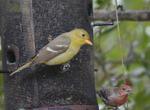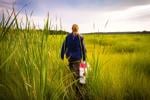South Carolina wildlife officials are asking residents who hang bird feeders to take them down for the next few weeks out of fear they might be spreading disease.
The S.C. Department of Natural Resources said they're concerned by a rise in bird deaths and believe dirty feeders are to blame.
Residents should take the feeders down until early April, they said.
"This is just one less place for birds to congregate and spread any disease or bacteria among each other," Amy Tegeler, DNR's bird conservation coordinator, said.
Mold or bacteria can easily form on wet bird seed, either in the bird feeder or on the ground, according to DNR. If bird feeders aren't properly maintained, then spoiled feed, seed hulls and waste can severely harm local bird populations.
"This moldy bird seed and uncleaned bird feeders can cause birds to become sick," DNR's release said. "Specifically, mold can cause fatal avian diseases. The risk is greatly reduced when bird feeders are cleaned regularly."
Wildlife officials discovered that Pine Siskins — small birds in the finch family that range widely across North America but are considered by conservationists to be in steep decline — and some other species have been dying.
"While Pine Siskins are more susceptible than other species to getting sick from dirty bird feeders, there has been an increase in the number of reports SCDNR has received from across the state in the last several weeks," according to the agency.
The department said residents shouldn't be concerned that the short-term removal will cause lasting harm to birds that sometimes favor seeds placed out by humans.
"Bird feeders are a wonderful way for people to enjoy and help birds right in their backyards. Unfortunately, keeping bird feeders isn't as easy as just putting one up and making sure it stays filled with food, it requires regular maintenance and cleaning," Tegeler said. "And when outbreaks such as this happen, it's a great reminder of just how important it is to keep feeders clean so birds can continue to thrive in South Carolina."
Anyone who finds sick birds can report them to a wildlife rehabilitator, she said. Dead songbirds should be handled with gloves and buried or removed in a plastic bag so that disease won't be transmitted to pets or humans.
"In some yards Pine Siskins are gathering in large numbers during this 'irruption' year," said Jennifer Tyrrell, engagement manager for Audubon South Carolina. "It's important now that if you're seeing Pine Siskins you take your feeders down until they have left the area as Salmonella cases are one the rise."
An irruption year is marked by finch species moving south in search of food when their usual sources — conifer forests in the U.S. and Canada — run low, according to the National Audubon Society.
"Regardless of whether or not you have finch flocks at your feeders, keeping them clean is essential if you want to responsibly and safely feed birds in your yard," Tyrrell said.
Even if one homeowner keeps their feeders clean, others in the area may not be, she said, which means other birds could be bringing disease in to contaminate other feeders.
"bird" - Google News
March 09, 2021 at 02:00AM
https://ift.tt/3btfOaI
SC wildlife officials: Your dirty bird feeders are deadly. Take them down. - Charleston Post Courier
"bird" - Google News
https://ift.tt/2s1zYEq
https://ift.tt/3dbExxU
Bagikan Berita Ini

















0 Response to "SC wildlife officials: Your dirty bird feeders are deadly. Take them down. - Charleston Post Courier"
Post a Comment